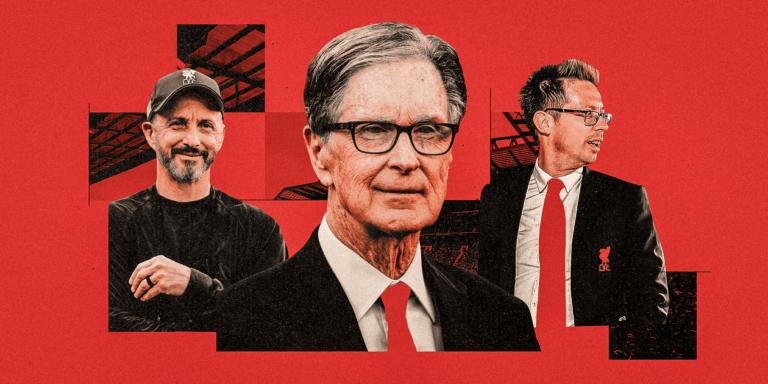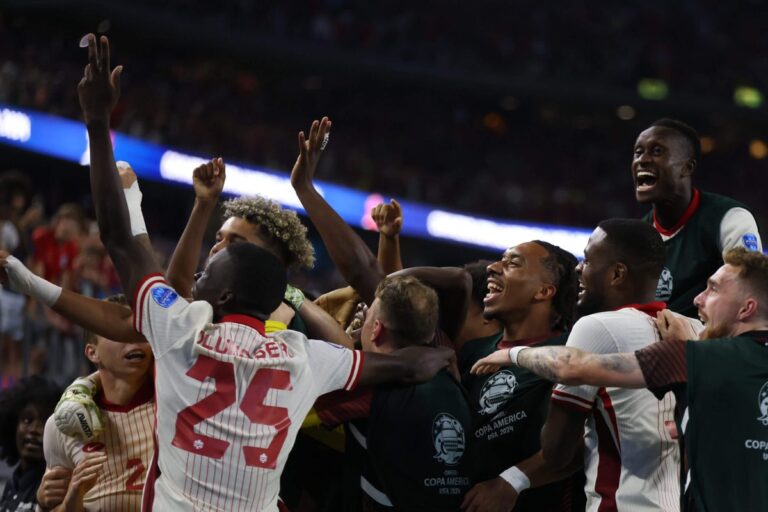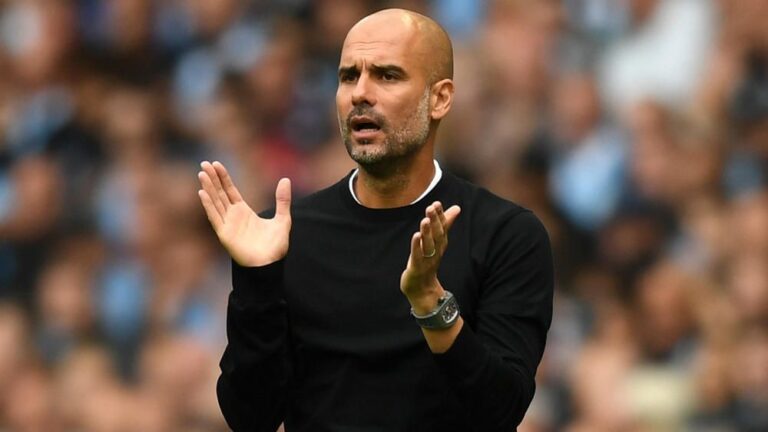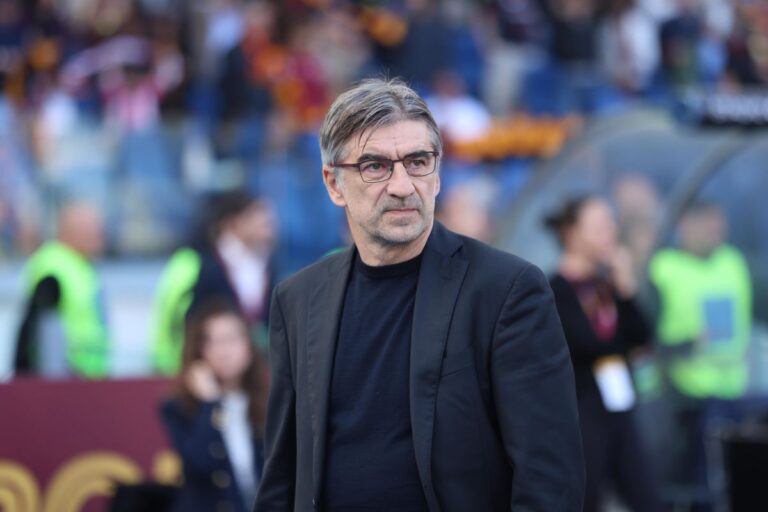
How Liverpool 2.01 was built – and FSG abandoned any plans to sell
With Christmas approaching two years ago, Fenway Sports Group’s ownership of Liverpool Football Club was at a crossroads. Uncertainty reigned.
U.S. banks Goldman Sachs and Morgan Stanley had been tasked with sounding out interest from investors. FSG, the Boston-based firm that had paid £300million ($380m in today’s exchange) for Liverpool in October 2010, had long since been open to the idea of selling a minority stake, but the difference this time was that a full sale was also on the table.
“We’re exploring a sale, but there’s no urgency, no time frame for us, and as far as I’m concerned, it’s business as usual,” Liverpool chairman Tom Werner told the Boston Globe in November 2022. “One outcome could be our continued stewardship for quite a while.”
The backdrop was key. Having seen Chelsea sold six months earlier to a consortium led by Los Angeles Dodgers part-owner Todd Boehly for £2.5billion — with another £1.75bn committed to investing in the club’s infrastructure — FSG wanted to establish what potential buyers would pay, with Forbes valuing the club at around £4bn.
With then sporting director Julian Ward and director of research Ian Graham both serving notice to quit their roles and Jurgen Klopp’s side a fading force on the field, it all added to a growing sense of turmoil.
Two years on, the landscape is very different. FSG remains at the helm and under their stewardship a new era has been launched. Liverpool are top of both the Premier League and the group phase of the Champions League, and in the quarter-finals of the Carabao Cup, where they face Southampton tonight.

Arne Slot has hit the ground running (Alex Livesey/Getty Images)
What was billed as the most difficult transition facing a major Premier League club since Sir Alex Ferguson retired as Manchester United manager in 2013 has so far proved to be almost seamless.
Klopp’s ‘Liverpool 2.0’ restored the club to Europe’s elite before his emotional Anfield goodbye in May and since then Arne Slot has led an evolution rather than revolution.
This is Liverpool 2.01. The Dutch coach has made some subtle changes, but on the field the personnel are largely the same.
Off it, it’s a different story. The football executive structure, under the control of FSG’s CEO of football Michael Edwards since he returned in March — nearly two years after he stepped down as sporting director — has been transformed, with a raft of new appointments to senior positions.
Most recently, there have been major changes to the club’s recruitment department and how Liverpool manage the increasingly important loan market.
FSG still has its critics, with a section of the fanbase frustrated at its rigid commitment to a self-sustaining business model and an unwillingness to take greater risks in the transfer market.
But there is also little doubt that FSG’s 14-year reign at Anfield has been given fresh impetus — and that any talk of a sale is off the table.
In the absence of any suitably attractive proposals, it was increasingly clear by January 2023 that FSG would only be selling a minority stake in Liverpool.
Senior club officials, speaking anonymously to protect relationships, tell eScored now that they viewed the process as “a fishing expedition”.
“There was never any clearing of the decks, it felt like it was more a case of testing the market,” one said. “And if you want to sell a slice of the cake for the best possible price, it makes sense to establish what the whole cake is worth.”
In September 2023, following discussions with a number of interested parties, FSG sold a small stake in Liverpool to New York-based sports investment firm Dynasty Equity. Sources close to the deal said it was worth between $100m and $200m — a stake of around 3-4 per cent.
FSG made it clear that the money would be used to reduce bank debt and go towards the cost of projects such as the Anfield Road Stand redevelopment and the repurchasing of Melwood training ground for the women’s team.

The new Anfield Road Stand has been a major FSG project (Michael Steele/Getty Images)
Just two months after a line was effectively drawn under the long search for fresh investment, Klopp dropped his bombshell that he intended to step down at the end of the season. It was kept a closely guarded secret until Klopp went public in late January 2024.
While the outside world went into a frenzy about Klopp’s potential successor, with Bayer Leverkusen’s Xabi Alonso quickly labelled the frontrunner, the priority for FSG principal owner John W. Henry, FSG president Mike Gordon and Werner was establishing who would lead that managerial search.
Liverpool didn’t have a sporting director with interim appointment Jorg Schmadtke, who had been tempted out of retirement, having left the club towards the end of the January window.
Gordon had turned to Schmadtke as a stop-gap the previous summer having found there was a dearth of suitable long-term candidates to replace Ward.
The FSG hierarchy firmly set its sights on luring Edwards back. He had a proven track record of success and sound decision-making, but Edwards made it abundantly clear that he had no interest in returning to his old job.
However, during face-to-face discussions in Boston in early March, Gordon piqued his interest. The FSG president had long since been looking to relinquish day-to-day decision-making on all football matters and saw the end of the Klopp era as a sensible cut-off point.
Edwards was effectively offered Gordon’s job and accepted. As well as the increased responsibility, part of the attraction for Edwards was FSG’s commitment to pursuing a multi-club model. In July, they held talks to buy troubled French outfit Bordeaux but pulled out due to financial concerns. Other options are currently being assessed.
“Michael is one of the most formidable executive talents in world football and John, Tom, and I are absolutely thrilled to have secured his services for our business,” Gordon said in a statement when Edwards’ appointment was confirmed. “He returns to us in a role with greater seniority than he held previously and with a wider remit.”
Gordon remains on the FSG Board, which Edwards reports to.

Michael Edwards (left) with Jurgen Klopp and Mike Gordon (right) in 2019 (John Powell/Liverpool FC via Getty Images)
Former Liverpool director of research Graham, who founded sports advisory business Ludonautics in 2023, lost the services of Edwards, who had been working with him as a consultant having turned down interest from several top clubs across Europe.
“Michael was adamant (in saying) ‘I’ll never be a sporting director again’,” Graham told eScored in August. “Running recruitment, as well as all the other departments at the training ground, is really stressful. The reason he went back is because they offered him something new and exciting.
“John Henry, Mike Gordon and Tom Werner see football in the same way Michael does. They demand high standards and Michael has proved over an extended period previously that he lives up to them. He has a systematic way of doing things. That’s the way Fenway works, so there’s a natural fit between them and Michael.”
Edwards’ first task was to appoint Richard Hughes as sporting director.
Their relationship went back two decades to the days when Hughes was playing for Portsmouth and Edwards was an analyst at the south coast club.
Given Hughes’ body of work as technical director at Bournemouth, where shrewd recruitment had enabled them to consistently punch above their weight, Edwards was surprised that the Scotsman hadn’t previously been headhunted.
Edwards also brought back some familiar names. Ward was appointed FSG’s technical director, tasked with overseeing elite player development across FSG’s football operations, including Liverpool’s academy and the club’s work in the loans market.
David Woodfine, who was director of loans management prior to leaving Liverpool in May 2023, was made assistant sporting director to help ease the burden on Hughes. Edwards had previously found it useful having Ward as his deputy.

Richard Hughes (right) and his assistant sporting director David Woodfine (Robin Jones/Getty Images)
With one eye on the planned purchase of another club, Pedro Marques was recruited from Benfica as FSG’s director of football development, while Hans Leitert was promoted to the role of FSG’s head of global goalkeeping.
Key positions had been filled — but the question remained, how would they work together?
Edwards has been an infrequent visitor to the club’s training base in Kirkby so far this season as he leaves Hughes to get on with the day-to-day running of Liverpool.
Their personalities are very different: Edwards can be combative, Hughes more calm and measured. However, the owners believe they complement each other well.
It was Hughes who oversaw the process which led to the identification and appointment of Slot as head coach in May and the subsequent additions to his backroom staff.
Across all the different data metrics provided by director of research Will Spearman, from playing style to injury prevention, and outperforming his resources, Slot came out on top. The character references Hughes assembled were glowing and, crucially, Slot also had the self-belief to embrace the challenge of following in Klopp’s footsteps.

Ruben Amorim, who left Sporting Lisbon for Manchester United last month, was among the other contenders considered. But Liverpool felt that his favoured three-at-the-back formation wouldn’t suit the current squad. They also had doubts over whether the Anfield crowd would warm to his playing style.
In contrast, when Liverpool sent a delegation to Feyenoord games, they were struck by how Slot’s brand of football energised the Dutch club’s passionate, working-class fanbase.
Hughes has been involved in the redesign of key areas of the training ground over the past six months with the aim of maximising collegiate working between staff across all departments.
He also leads the way on transfer talks, squad planning and contract negotiations. It hasn’t all been plain sailing on that front.
Liverpool missed out on top summer target Martin Zubimendi after he opted to stay at Real Sociedad in August. The sense of disappointment has been eased by the subsequent impact of Ryan Gravenberch, who has shone in a deep midfield role, but there was still a sense of unease at Liverpool making just one senior signing — Federico Chiesa, a £10million buy from Juventus — in the summer.

Federico Chiesa was Liverpool’s only summer signing (Dan Mullan/Getty Images)
Discussions over contract extensions for Mohamed Salah, Virgil van Dijk and Trent Alexander-Arnold have also dragged on: all three have deals which expire at the end of the season and are free to negotiate with overseas clubs in just under two weeks.
Elsewhere, however, major changes have been made, with Hughes overseeing an extensive revamp of the club’s scouting and loan management operations. That coincides with Dave Fallows stepping down as director of scouting and recruitment having worked for Liverpool since 2012. He was going to leave at the same time as Klopp but after discussions with Edwards and Hughes, he agreed to stay on until Christmas to help with the transition process.
Fallows will not be directly replaced. The recruitment department has already changed significantly with Woodfine brought back as Hughes’ No 2.
New head of scouting operations Craig McKee and head of technical scouting Mark Burchill both followed Hughes from Bournemouth to Merseyside in the summer. Liverpool can also still count on the vast experience of long-serving chief scout Barry Hunter.
Matt Newberry has been rewarded for his contribution as head of senior academy recruitment and head of loan management with a promotion to the new role of director of global talent. It’s about trying to make sure Liverpool are at the front of the queue for the best local, national and international young players.
As well as bringing through home-grown players of the calibre of Alexander-Arnold and Curtis Jones, they want to add to add to that crop with the kind of deals that saw teenagers Trey Nyoni (Leicester City) and Rio Ngumoha (Chelsea) move to Liverpool.

Trey Nyoni is one of Liverpool’s most highly-rated young players (Chris Brunskill/Fantasista/Getty Images)
Liverpool also intend to appoint a global talent scout and they are creating four new regional European scouting jobs, including roles in the Netherlands and Belgium.
For all the focus on the club’s use of data to influence decision-making during Edwards’ tenure as sporting director, he has always placed a strong emphasis on the ‘eye test’ and the importance of having an extensive network of scouts to create key relationships.
Hughes has pinpointed where he believes Liverpool can improve on that front and his plan to fill the void is being backed with resources.
As well as recruiting a new head of loan management following Newberry’s promotion, Liverpool have also created two further associated roles, loans pathway lead and loans performance analyst.
It reflects the importance of the loan market to both develop young players and also enhance their value. Picking the right environment for them to gain more senior experience is key.
Teenage winger Ben Doak has kicked on impressively so far this season on loan at Championship side Middlesbrough, and with Scotland. Lewis Koumas has done likewise at Stoke City. Conor Bradley, Jarell Quansah and Harvey Elliott have all previously returned from loans much better equipped to challenge for a place in the Liverpool side.
When Klopp spoke to his players in the dressing room after the final game of his reign at Anfield in May, he told them: “You have made a great start to the new era. Now you will all benefit from new energy.”
Those words proved prophetic. New voices, new ideas, but all underpinned by the same high standards. Slot has built on what Klopp left behind and has been helped by the structure created by Edwards and Hughes around him.
What a contrast to two years ago when talk of a possible takeover dominated the agenda and there were major issues that needed addressing both on and off the pitch.
With Henry and Werner now in their mid-70s, it is perhaps no surprise they seem content to let Edwards become the face of FSG’s football operation.
But now there are no whispers of takeovers, or even of FSG diluting their position. For the senior officials spoken to by eScored, such talks are completely “off the table”.
The club that FSG has controlled for 14 years remains tightly in its grip.
(Top photos, from left: Mike Gordon, John W. Henry and Michael Edwards; Getty Images; design: Dan Goldfarb)





